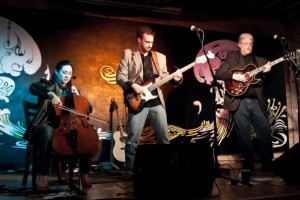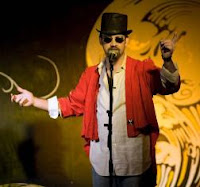I like indie music. And apparently a lot of other people do, too.
All you have to do is browse through the music section of MySpace, or spend a little time on YouTube, to see how the indie music wave is growing. (For newbies…indie music is a nickname for independent music, meaning the music was produced and released without the backing of a major label or corporation–essentially from the “outside” of the established industry.) Although the musical styles are wide and varied, indie music itself has pretty much become its own genre. And although not too many indie artists are getting rich (yet), I think they are part of more than a trend–I think indie music is set to reshape the musical landscape. It’s a grassroots shift that we haven’t seen in music since rock-n-roll was born in Sam Phillips’ little Memphis studio.
There are a lot of dynamics all feeding into the indie music phenomenon–for example, modern technology, postmodernism, even designer coffee!–but among the different musical streams, indie music is the only one truly maximizing the positive benefits of these cultural changes. In short–indie music is doing everything right at the moment.
Having said all that…here are four specific reasons why I think indie music represents the future of music in general:
REASON ONE: The music industry machine is set in its ways.
Generally speaking, the music business–the community of major record labels, distributors, and decision-makers, the “movers and shakers”–hasn’t been “moving and shaking” in quite some time. They have become a fairly exclusive club–the “establishment”, if you will. They are in business to make money from music sales, and they have certain formulas they follow to bring in predictable results. The industry majors take fewer and fewer risks; these days, an artist has to generate a huge buzz, to prove he/she can sell records, before the big guys will even look at them. The creativity and risk-taking spirit that built the industry is seen more and more as a liability, and musical innovation must take a back seat to the tried-and-true methods of selling records. The end result is–all the music is starting to run together. High-quality production, excellent recordings, and lots of marketing–but standout artists are getting much harder to find.
The point is, the industry has rules, and those rules take precedence over creativity. Play ball, and they’ll help you sell records; otherwise, you’re on your own. When the vehicle that should be encouraging creativity in new artists actually becomes the obstacle standing in their way–creativity will find a way around it. And that’s really what’s happening with indie music. People are finding alternate ways of delivering their music to the public, without industry bigwigs deciding what can and cannot be tried. And because the music industry product is becoming more and more stale–the fresh sounds coming out of the indie camp are a breath of fresh air to more and more listeners.
REASON TWO: Modern technology has made it easier to self-publish.
The rise of cheap digital technology and the Internet could not have come at a more opportune time for indie artists. Who could have predicted that one day people could record their music on their laptop, make a video of themselves with a webcam, post their stuff on places like PureVolume, MySpace and YouTube, spread it virally through the social networks, and gain an international following–all without the help of the music industry? We’re seeing it happen more and more; smarter computers and the self-published Internet are creating new celebrities simply by giving them an unprecedented level of access to the public. True enough, there is a lot of garbage and mediocrity out there to weed through, and you can’t be a star just by posting on YouTube (artists still have to create something people want to hear). But these things are the marketing tools of the 21st Century–and they are in the hands of indie artists. Through the Internet, the public can hear and enjoy indie bands, buy their music online, find out where they are playing live, and go support them. The growth of indie music wouldn’t be happening without this.
REASON THREE: Our culture is tribalizing.
What this means is that as a people, we are identifying less and less with our larger national identities, and more and more with smaller segments of society. We are forming new “tribes”, if you will, over our shared interests and passions. This is especially true of the younger generation, and it’s affecting our tastes and preferences. We are getting jaded by the constant bombardment of highly-polished mass-marketing messages, and we’re beginning to react by leaning more toward the organic, the grassroots, the less-than-perfect–the diamonds in the rough. This is a perfect breeding ground for indie music, which appeals to smaller fan bases, is less polished, is promoted at the ground level, and has a definite “underdog” appeal. Even as the larger industry is turning out fewer “superstars”, it may also be that the age of the music “superstar” is on its way out. The younger generation is beginning to favor the unknowns and the lesser-knowns, and more bands may be reaching out to smaller audiences. This dynamic also favors the indie scene, because smaller audiences means there is plenty of room for new bands and artists to emerge.
REASON FOUR: The public is hungry for creativity.
This really ties in with the first point, but is probably the single-most important factor in the rise of indie music. The tight control the music industry/establishment exercises over its artists, by definition, squelches creativity; being creative is all about doing something differently than before, finding fresh ways to express ideas. The thing is, it isn’t just about the artists having the inspiration and freedom to create; we, the people, draw inspiration from their inspiration! We need the artist’s creativity, too. Because creativity is ebbing in the mainstream, the overall output is getting stale–and we’re getting hungry, even desperate, to hear something new. Indie music is now beginning to meet that need in us where mainstream music is not.
Now, none of this is to suggest that people aren’t still buying music by Britney Spears, Beyonce or Nickelback, because they are. Even with the piracy problems in the age of the Internet–by sheer volume, the mainstream music industry still rakes in billions of dollars a year, and won’t necessarily be going the way of the dinosaur overnight. But the cracks in the foundation are showing, and due to the unique combination of trends we’ve just discussed…the industry bigwigs are no longer holding all the cards. If an artist is overlooked or dismissed by the major labels, or just doesn’t want to jump through the hoops–there are now other options, other ways of getting things done. And that’s probably the biggest reason why more and more musicians are now “going indie”: because they can. If these trends continue–barring a major overhaul of the music industry–I think it spells a huge shift in the way music is produced, bought and sold, and a shift of creative control from label to artist. As it is with any major change–those who will adapt, will survive. Those who will not, won’t.
Indie music is riding the wave of change in a nearly perfect manner. Beyond just adapting to the moment–it seems this moment was made for the indie artist. And that’s why I think indie music is the future of music.









